
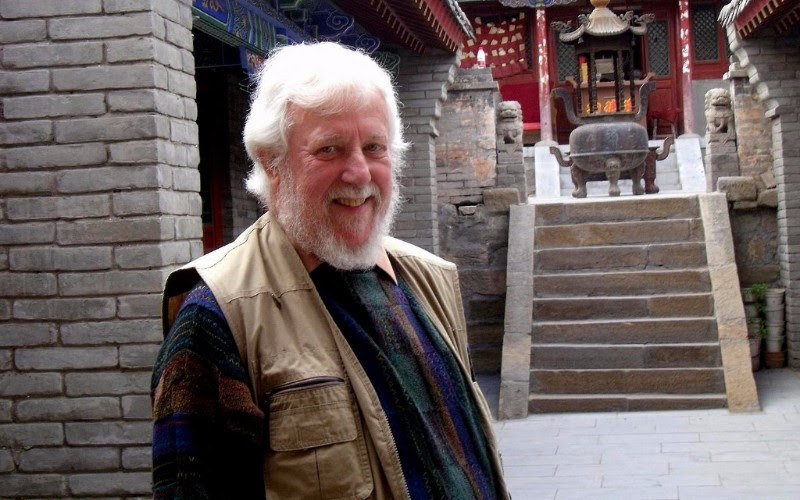
UNWTO awards Geoffrey Wall the Ulysses Prize for Excellence in the Creation and Dissemination of Knowledge in Tourism
The UNWTO Ulysses Prize for Excellence in the Creation and Dissemination of Knowledge recognizes the remarkable work of Professor Geoffrey Wall on several issues, but particularly on tourism and climate change. The Prize will be bestowed on Professor Wall during the UNWTO Awards Ceremony to be held on 18 January 2017 in Madrid on the occasion of FITUR, the International Tourism Trade Fair in Madrid, Spain.
Professor Wall is a Distinguished Professor Emeritus at the Department of Geography and Environmental Management, University of Waterloo, Canada, where he has been teaching for more than 40 years.
The Prize has particularly valued Professor Wall’s pioneer research on tourism and climate change and his work on ecotourism and tourism planning. His ecotourism assessment framework and economic impacts assessment models have been effectively implemented in parks and protected areas in many parts of the world. Most of his research has been undertaken in Asia, with a recent emphasis on natural and cultural heritage and indigenous people.
A prolific writer and researcher, Professor Wall has published more than 200 publications in refereed journals, more than 100 book chapters and about 20 books and monographs. He has also supervised more than 100 graduate students; many of them are now leaders in the tourism field.
Professor Wall has also considerable involvement in practical international planning initiatives. For example, he contributed to the Bali Sustainable Development Project, directed two Five-Year projects in China on coastal zone management in Hainan, and on eco-planning and development; and has been an advisor on many tourism planning initiatives, from provincial to local level, especially in China. He is currently assisting the preparation of the application for UNESCO World Heritage sites in Western China.
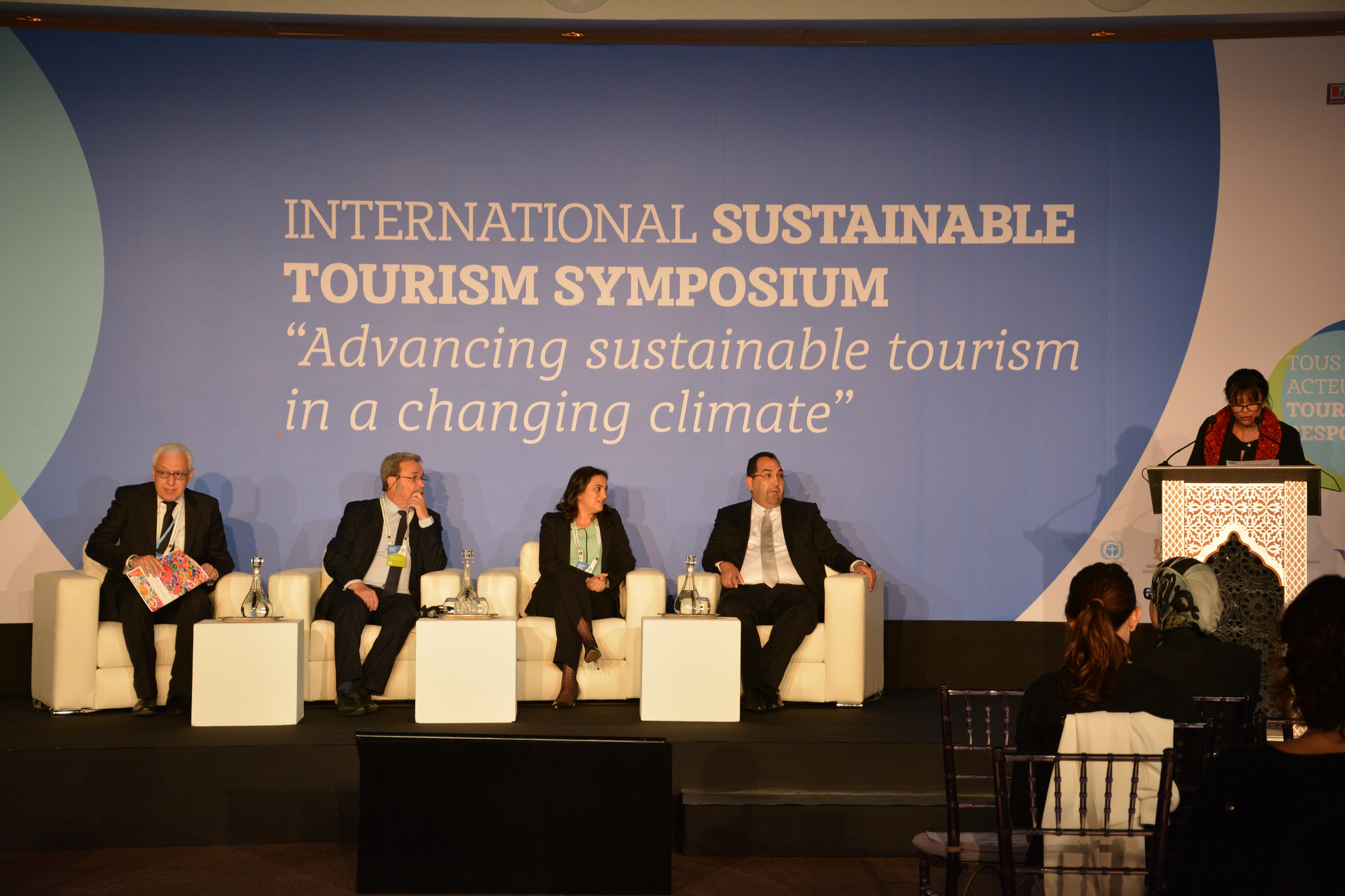
Tourism committed to fight climate change – COP 22
The role of tourism in implementing the Paris Agreement was on the table on the occasion of the 22nd Session of the UNFCCC Conference of Parties (COP22). The International Symposium of the Sustainable Tourism Programme of the United Nations 10-Year Framework of Programmes on Sustainable Consumption and Production (10YFP), held during COP 22, discussed how to advance Sustainable Tourism in a Changing Climate.
The Symposium aimed at increasing awareness on tourism and climate change-related issues and encourage the sector to engage in actions that reinforce national commitments to the Paris Agreement and the 2030 Sustainable Development Agenda.
“The tourism sector is both a vector and a victim of climate change and we are fully committed to contribute to reach the objectives set by the Paris Agreement. This event was essential to advance this agenda, especially the discussion on measurement and reporting requirements as a basis for identifying and prioritizing climate action in tourism”, said UNWTO Secretary-General, Taleb Rifai.
“Sustainable tourism creates opportunities and assembles partners to help transform the industry towards low emissions and more efficient and less polluting operations. We must make tourism and every other industry contributor to our climate change action and a sustainable future”, said Patricia Espinosa, UNFCCC Executive Secretary, in her video address to the event.
The event focused in particular in the need for partnerships with the private sector and the role of sustainable transportation to accelerate climate action in tourism.
“Climate change can only be addressed if actors from all parts of society – governments, businesses, NGOs and consumers – make a global and broad shift towards sustainable consumption and production patterns. Accounting for 10% of GDP, 7% of the world’s exports and one in 11 jobs, tourism is one of the main economic sectors in the world, and as such has to be at the core of this essential transition,” said Charles Arden-Clarke, Head of the 10YFP Secretariat.
The International Symposium was part of the 3-day COP22 Tourism Side Events organized by the 10YFP Sustainable Tourism Programme and hosted by the Ministry of Tourism of Morocco. The Programme is a partnership led by UNWTO with the Governments of France, Morocco and the Republic of Korea as co-leads, with support of the 10YFP Secretariat at UN Environment, aimed at accelerating the shift towards more sustainable consumption and production. It was followed by a networking event involving financial institutions on sustainable tourism as well as by the Annual Conference on Saturday 12 November, where members of the network exchanged experiences and discussed priorities and next steps in the 10YFP Sustainable Tourism Programme.
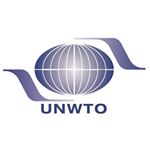
Economic and national security a common objective: UNWTO/WTM Ministerial
Ministers of Tourism from nearly 60 countries and industry leaders gathered at the Ministers’ Summit organized by the World Tourism Organization (UNWTO) and World Travel Market in London to discuss how to grow cooperation in safe, secure and seamless travel. The inclusion of tourism in crisis and emergency structures, travel advisories, perception and coordination were pointed as main issues to be addressed. Participants agreed that economic and national security can and should be a common objective.
The 10th edition of the Minister Summit was held under the title ‘Tourism and Security: Promoting Safe and Seamless Travel’. The event discussed the various risks affecting travel and tourism – health scares, natural disasters, geopolitical changes and terrorism – and called for a full integration of tourism into national crisis and emergency structures.
The lack of a coordinated approach and the need to set crisis management systems were pointed out as the biggest challenges to safe, secure and seamless travel. Participants stress that security is a shared responsibility among public and private sector and across government administrations at all level. In this respect, they recalled the need to build global standards and recognition of mechanisms such as passengers’ information.
“Underpinning our discussions is the conviction that advancing safe, secure and seamless travel requires national and international coalitions between all tourism and security stakeholders as well as between public and private sectors” said UNWTO Secretary-General Taleb Rifai,
Perception was pointed out as one of the main obstacles in crisis management and recovery. In this respect, ministers and private sector called for increased capacity in crisis communication and management as well further collaboration among public and private sector and the media stressing that communication should be clear on ‘what the situation is’ and ‘what is being done’.
Participants unanimously agreed that “what happens in any destination affects all others” and that as such the international community needs to work further together on travel advisories and increase dialogue between destinations and source markets. “Tourism brings jobs and economic growth; and if we fail to support destinations affected we fail to create social stability and peace” said participants.
The Summit was chaired by CNN International’s Becky Anderson.
Summit Speakers: Mark Tanzer, Chief Executive, Association of British Travel Agents (ABTA); Nina Brooks, Head, Security, Airports Council International (ACI); H.E. Obediah Wilchcombe, Minister of Tourism of the Bahamas and Chairman of the Caribbean Tourism Organization (CTO); Beatrice Maille, Director General, Consular Policy Bureau, Global Affairs Canada, H.E. Mohamed Yehia Rashed, Minister of Tourism, Egypt; Vijay Poonoosamy; Vice President International Affairs; Office of the President & CEO; Etihad Airways; Paul Steele, Senior Vice President Member and External Relations, Corporate Secretary, International Air Transport Association (IATA); H.E. Vinod Zutshi, Secretary, Ministry of Tourism, Government of India; Ryoichi Matsuyama, President; Japan National Tourism Organization (JNTO); H.E. Edward Zammit Lewis, Minister of Tourism, Malta, Fritz Joussen, Chief Executive Officer, TUI; Aldo Lale-Demoz, Deputy Executive Director and Director of the Division for Operations, UN Office on Drugs and Crime (UNODC); Isabel Hill, Director, National Travel and Tourism Office, United States Department of Commerce and David Scowsill, President and CEO, World Travel & Tourism Council (WTTC).
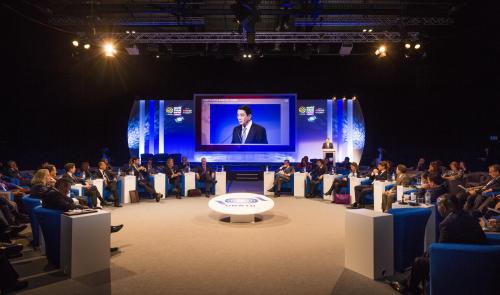
UNWTO/WTM Ministers Summit discusses Safe and Seamless Travel
Minister of Tourism from over 50 countries and leaders from the private sector companies and associations will convene at the Ministers Summit organized by the World Tourism Organization (UNWTO) and the World Travel Market in London, to discuss safe, secure and seamless travel.
The 10th edition of the Minister Summit to be held on 9 November under the title ‘Tourism and Security: Promoting Safe and Seamless Travel,’ will address the major safety and security challenges that the sector faces, ways of cooperation and effective crisis preparedness and management.
As stated by UNWTO Secretary-General Taleb Rifai, “safety and security are key pillars of tourism development and we need to strengthen our common action to build a safe, secure and seamless travel framework. I trust this Summit will help us move forward on this important common challenge as we work to ensure that safety and security can go hand in hand with promoting a seamless travel experience.”
World Travel Market London Senior Director, Simon Press, said: “Safe and Seamless travel is the key topic for all those involved in global travel and tourism. All the speakers at this year’s summit have direct experience of the impact of terrorism and the fight to keep nations, citizens and tourists safe. I look forward to a thought-provoking and productive discussion”.
The Summit is chaired by CNN International’s Becky Anderson. Confirmed speakers include:
– Mr. Mark Tanzer, Chief Executive, ABTA
– Ms. Nina Brooks, Head, Security, Airports Council International (ACI) World
– H.E. Mr. Obediah Wilchcombe, Minister of Tourism of the Bahamas, Chairman of the Caribbean Tourism Organization (CTO)
– H.E. Ms. Beatrice Maille, Director General, Consular Policy Bureau , Global Affairs Canada, Canada
– H.E. Mr. Mohamed Yehia Rashed, Minister of Tourism, Egypt
– Mr. Vijay Poonoosamy, Vice President International Affairs, Office of the President & CEO, Etihad Airways
– Mr. Paul Steele, Senior Vice President Member and External Relations, Corporate Secretary, International Air Transport Association (IATA)
– H.E. Mr. Vinod Zutshi, Secretary, Ministry of Tourism, Government of India, India
– Mr. Ryoichi Matsuyama, President, Japan National Tourism Organization (JNTO)
– H.E. Mr. Edward Zammit Lewis, Minister of Tourism, Malta
– Mr. Fritz Joussen, Chief Executive Officer , TUI
– H.E. Mrs. Selma Elloumi Rekik, Minister of Tourism and Handicrafts, Tunisia
– H.E. Mr. Nabi Avci, Minister of Culture and Tourism, Turkey
– Mr. Aldo Lale-Demoz, Deputy Executive Director and Director of the Division for Operations, UN Office on Drugs and Crime (UNODC)
– H.E. Ms. Isabel Hill, Director, National Travel and Tourism Office, United States Department of Commerce
– Mr. David Scowsill, President and CEO, World Travel & Tourism Council (WTTC)
Moderator: Becky Anderson, CNN International
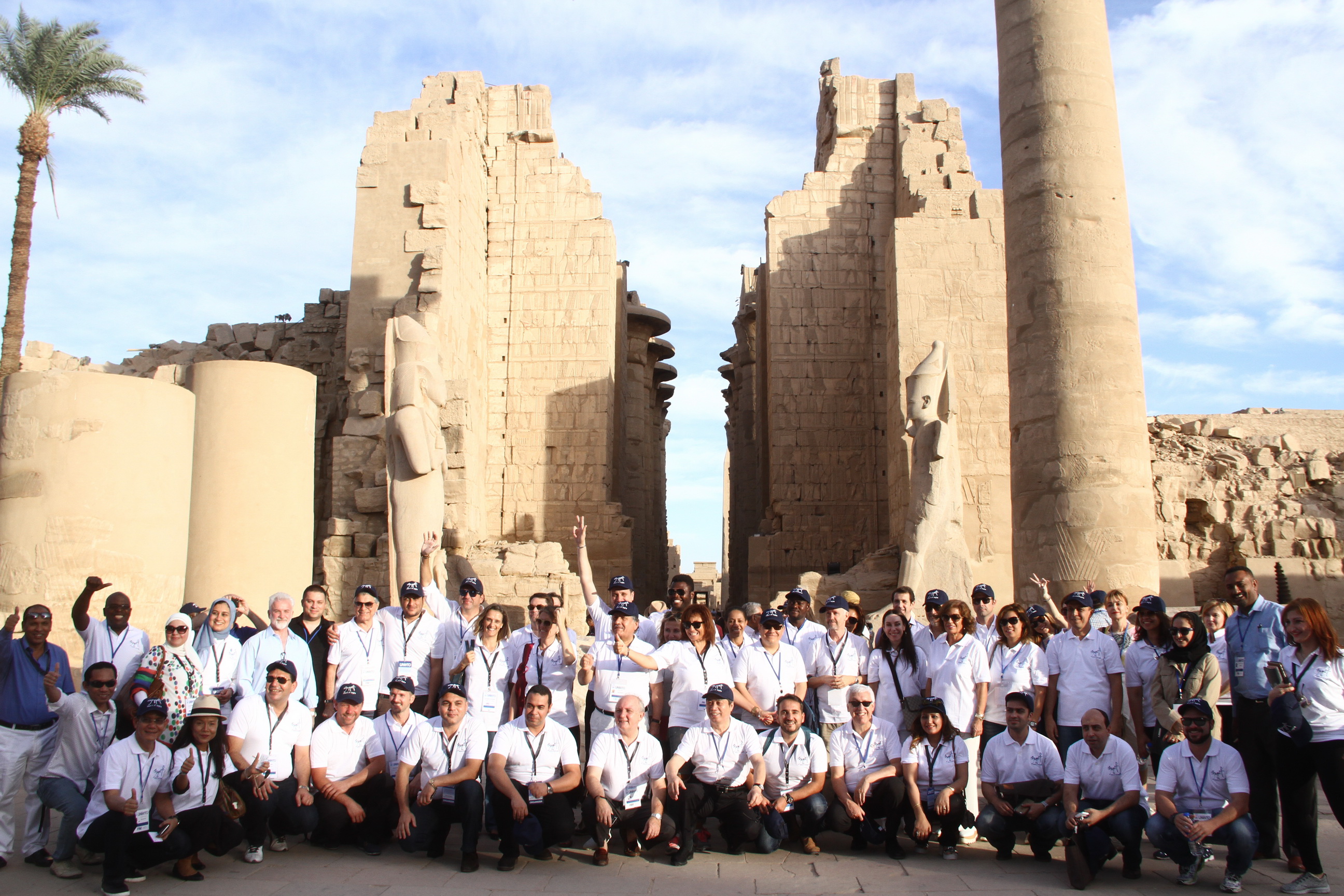
Urban planning and city tourism need to go “hand in hand”, concludes UNWTO Summit
The 5th UNWTO City Tourism Summit in Luxor, Egypt gathered around 400 experts from 40 countries to discuss the theme ‘Cities: Local culture for a global traveler’. The event, organized by the World Tourism Organization (UNWTO) and the Ministry of Tourism of Egypt, concluded on the importance of ensuring urban planning and city tourism development are fully coordinated. Authenticity, local culture, the engagement of local communities and the use of technology were pointed out as key success factors for city tourism.
Participants discussed city tourism trends including new business models, such as the so-called “sharing economy”, the importance of millennials, emerging niche markets, how to build authentic cultural experiences and engage local communities, safety and security, and congestion management.
The Minister of Antiquities of Egypt, Khaled El-Enany, Minister of Tourism Mohamed Yehia Rashed, Governor of Luxor Mohamed Sayed Badr, the Assistant Minister of Foreign Affairs for International Organizations of Egypt, Hisham Badr, UNWTO Secretary-General Taleb Rifai and the President and CEO of the World Travel and Tourism Council (WTTC), David Scowsill, addressed the meeting.
“Holding this event in Luxor shows how Egypt and its people are committed to tourism and is a very positive sign that Egypt will recover to be the leading tourism destination it has historically been,” said Minister Rashed.
UNWTO Secretary-General Taleb Rifai expressed the Organization’s full confidence in Egypt’s tourism recovery, recalling that holding such an important meeting in Luxor displays the trust of the international tourism community in the destination.
The High-Level Panel of the Summit, moderated by BBC Travel Show presenter Rajan Datar, stressed the importance of placing tourism high in the urban agenda and creating mechanisms of coordination and joint planning. Issues of congestion management, safety and security, and engagement with host communities were also discussed.
“We should never fear the growth of the tourism sector; it is the way we manage it that makes the difference,” said Mr. Rifai during the panel. He stressed that “a city that does not serve its citizens will not serve its visitors, thus the importance of engaging local communities and tourists”.
Participants also stressed the need to maximize the resources generated by tourism for heritage preservation and renovation, the roles of gastronomy and creative culture in attracting and engaging tourists; and how the 270 million young travelers of today demand new authentic products and connectivity twenty-four seven.
The closing keynote was delivered by Egyptian archaeologist Mr. Zahi Hawass, who shared his exemplary experience.
During the Summit, UNWTO presented its City Tourism Network Action Plan as well as a new initiative – ‘Mayors for Tourism’ – that will see mayors and cities’ decision-makers collaborate on tourism issues.
The 6th UNWTO Global Summit on City Tourism will take place in Kuala Lumpur, Malaysia, in December 2017.

UNWTO Network of Sustainable Tourism Observatories welcomes Croatia Observatory
The Croatian Sustainable Tourism Observatory (CROSTO) has become a member of the UNWTO International Network of Sustainable Tourism Observatories (INSTO). This Observatory, hosted by the Institute for Tourism in Zagreb, is responsible for monitoring sustainable tourism in the Adriatic Croatia.
“Sustainable tourism development requires adequate measurement and evidence-based decision-making. We are very pleased to welcome the Croatian Sustainable Tourism Observatory to the UNWTO INSTO Network. We trust it can make a key contribution to support the vision set by Croatia for the future of its tourism sector; a sector that contributes to the three pillars of sustainability: economic, social and environmental” said UNWTO Secretary-General Taleb Rifai.
“Through its membership in INSTO, Croatia is also sharing the global strategic commitment to act responsibly and with care towards the space we live in,” mentioned the Ministry of Tourism of Croatia, Gari Cappelli.
Croatia’s commitment to sustainability has been emphasized in its Tourism Development Strategy 2020. The initiative aims at fostering innovation in the framework of sustainable tourism. The efforts of the country in that regard have been recognized by the European Commission through the concession of the ETIS and Accessible Tourism Awards to Mali Lošinj town. The breadth and depth of insights gathered on sustainable tourism practices on the island have been particularly praised in that recognition.

UNWTO and EBRD strengthen sustainable tourism in the SEMED region
MADRID, Spain, 27 of October 2016 – The tourism sector in the southern and eastern Mediterranean (SEMED) region has huge potential to become a major player in the economy and contribute to job creation. However, challenges remain.
In order to address issues facing the development of tourism in the SEMED region the World Tourism Organization (UNWTO), the European Bank for Reconstruction and Development (EBRD) and the Ministry of Tourism and Antiquities of Jordan held a two-day conference in Petra, titled ‘Investing in Tourism for an Inclusive Future: Challenges and Opportunities’.
Held under the patronage of Hani Mulki, the Prime Minister of Jordan, the conference brought together participants from the public and private sectors to discuss the role of tourism in creating job opportunities, promoting energy efficiency and strengthening micro, small and medium-sized enterprises (MSMEs).
Participants discussed the importance of access to training and appropriate skills to create employment opportunities for young people and women, and explored how to reduce skills mismatches. Compliance with international standards for hospitality, services, food quality and safety, as well as environmental and labour regulations, are vital for the competitiveness of the sector and its development, the conference noted.
Enhancing resource and energy efficiency by implementing and promoting sound policies and improving building standards was another focus of discussion, along with the role of financial institutions and investors as drivers of sustainable tourism.
In addition, participants considered how to strengthen the role and competitiveness of MSMEs in the tourism value chain. Sectors such as transport, handicrafts, hospitality, gastronomy, furniture and electronic appliances are interlinked with the tourism sector and can benefit significantly from its development. Yet, maximising the potential of tourism requires strong, coordinated action in areas such as market access, the movement of travellers, services, goods, quality and standards, and foreign direct investment.
“Despite the challenges that the SEMED region currently faces, it has tremendous potential for tourism as demonstrated by its record growth over the years. We must recall that tourism accounts for 15 per cent of the total exports of the region and that over the last 10 years international tourist arrivals increased from 48 million to 71 million in the MENA region alone. Considering tourism’s capacity to promote economic growth and advance inclusive development, we believe that this conference and its focus on investment will contribute to reviving the sector in the region,” said UNWTO Secretary-General, Taleb Rifai.
Mattia Romani, EBRD Managing Director for Economics, Policy and Governance, said: “Job creation and skills development, energy efficiency and MSMEs are priorities for the EBRD and by supporting the tourism sector we are targeting the various components to strengthen economic growth in the region. We also believe that an inclusive and thriving tourism sector that creates good jobs, in particular for young people, helps foster peace; when young people have good jobs, they also have incentives and ambitions to continue to grow, establish businesses, invest and, therefore, maintain such peace and stability. Together with UNWTO we are working to strengthen related policies and develop a sustainable sector.”
HE Lina Mazhar Annab, Minister of Tourism and Antiquities in Jordan, said: “Tourism is one of the most important socio-economic sectors in Jordan contributing close to 11 per cent to the gross domestic product. The government of Jordan realises the importance of this sector in generating revenue as well as in creating employment opportunities and has launched a number of economic reforms and incentives to facilitate investment in the country’s tourism. We need to continue providing all the necessary incentives to attract local and foreign direct investments in tourism because this sector generates jobs, empowers small and medium enterprises, and contributes heavily to the preservation and promotion of the natural and cultural heritage”.
Among the challenges for the sector, participants stressed the quality of the business environment (including public-private dialogue, political stability, security, visa facilitation, sanitation and health conditions, energy costs and other production factors); access to finance; availability of a workforce with appropriate skills; compliance with international standards (in hospitality, services, food quality and safety, environmental and labour regulations); and access to tourist destinations (including the quality and availability of infrastructure, such as airports and ports).

10th UNWTO/PATA Forum on Tourism Trends and Outlook commences in Guilin, China
The World Tourism Organization (UNWTO), the Pacific Asia Travel Association (PATA) and the People’s Government of Guilin of China celebrate between 20-22 October the 10th UNWTO/PATA Forum on Tourism Trends and Outlook. The theme of this special 10th anniversary edition is ‘Tourism 10:10 – Looking back to look forward’.
With the collaboration of the Polytechnic University of Hong-Kong, a UNWTO Affiliate Member, theForum has become over the last 10 years a reference platform on global and regional tourism trends. Parallel to the 10th Edition of the Forum, the 5th Annual Conference of UNWTO Sustainable Tourism Observatories in China will take place also in Guilin on 20 and 21 October.
“Tourism is a strong contributor to poverty alleviation as recognized by the Sustainable Development Goals and to be here in Guilin is the perfect occasion to remind that the Government of the People’s Republic of China has prioritized this sector as a tool to lift 17% of the country’s impoverished population out of poverty by 2020,” said UNWTO Secretary-General Taleb Rifai.
Tourism trends, changes in travel behavior and booking patterns and sustainable-related practices applied to the sector were some of the themes addressed throughout the Forum. The inclusive angle of tourism, a topic widely advocated by UNWTO, was also part of the discussions that addressed the participation of women in rural community tourism.
In 2015, Asia and the Pacific received 278 million tourists (+5% than in 2014) and will reach 535 million by 2030. International tourism generates xx billion USD in exports in Asia and the Pacific. As UNWTO elaborates in ‘Tourism 2030, A Global Overview,’ international tourist arrivals will reach 1.8 billion by 2030. By that time, Asia and the Pacific will gain most of the new arrivals. China is also a leading tourism destination – 4th in the world after France, USA and Spain with 57 million tourists in 2015.
The South East Asian region was the fastest growing in terms of international tourist arrivals in the first six months of 2016 with a growth rate of 9%, well above the global 4% increase registered in the world.
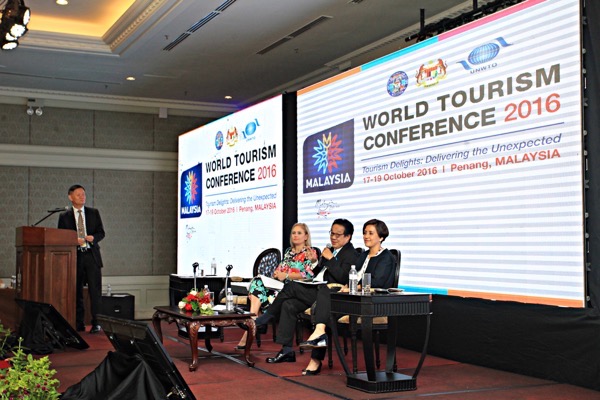
4th World Tourism Conference focuses on the ‘tourists first’ – improving the visitors experience
Malaysia, the second most visited destination in South East Asia, has hosted the 4th edition of the World Tourism Conference (WTC) jointly organized between the World Tourism Organisation (UNWTO) and the Ministry of Tourism and Culture Malaysia (MOTAC).
Under the theme ‘Tourism Delights: Delivering the Unexpected’, the Conference focused on strategies to enhance the visitors experience under the principle of “tourists first”. The round tables on ‘Tourism a Sunrise Industry?’ and ‘Tourism Experiences: Breaking New Grounds’ debated tourism trends beyond 2030 as well as how to reinvent the sector with a customer-oriented focus.
“We have witnessed two revolutions: on technology and on travel. The confluence of these has resulted in a new traveller who is technology-savvy, connected and informed who increasingly desires authentic, unique and valuable travel experiences and who is also more responsible and conscientious. Our sector needs to harness the emerging desire for ‘positive-impact’ tourism to contribute to a better world,” said UNWTO Secretary-General Taleb Rifai at the Opening of the Conference.
“A key element to advance tourism is creativity and innovation (…) in that regard, Malaysia has enhanced its tourism products by packaging “local community’s daily life” into a touristic offer – the “homestay experience” – providing travelers the opportunity to immerse in the traditional village lifestyle and to interact with local hosts, as well as other initiatives such as Villagestay, Visit MyFelda and Visit MyLonghouse,” explained the Minister of Tourism of Malaysia, YB Dato’ Seri Mohamed Nazri bin Abdul Aziz.
Additional sessions were dedicated to the endless opportunities that tourism brings to communities, where the relevance of sustainable practices, rural and youth tourism were underlined.
Malaysia has recently presented the Economic Transformation Programme (ETP) which has prioritized tourism as a catalyst for economic prosperity. Ecotourism, family-friendly destination, business tourism, and events, entertainment and sports have been emphasized within this strategy. With this Programme, Malaysia hopes to reach 36 million tourist arrivals by the year 2020. In 2015, Malaysia received 27.5 million international tourist arrivals.

UNWTO partners with EBRD to debate tourism in the MENA region
The World Tourism Organization (UNWTO) and the European Bank for Reconstruction and Development (EBRD) in cooperation with the Ministry of Tourism and Antiquities of Jordan are organizing a regional conference on ‘Investing in Tourism for an Inclusive Future: Challenges and Opportunities’. The Conference will take place in the world heritage city of Petra, Jordan, on 26-27 October.
Under the patronage of Jordan’s Prime Minister Hani Mulki, the conference will gather the ministers of tourism from Egypt, Jordan, Lebanon, Montenegro, Palestine and Tunisia, alongside representatives from the private sector, investment funds, tourism companies and associations.
Moderated by CNN Money Emerging Markets Editor John Defterios, participants at the high level panel will discuss how tourism can promote inclusive development in the southern and eastern Mediterranean with a particular focus on human capital, energy efficiency and micro, small and medium-sized-enterprises.
The partnership between UNWTO and the EBRD aims at supporting inclusive and sustainable tourism, building on UNWTO’s expertise in capacity building and the EBRD’s longstanding financial support for the private sector.
